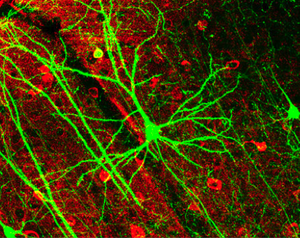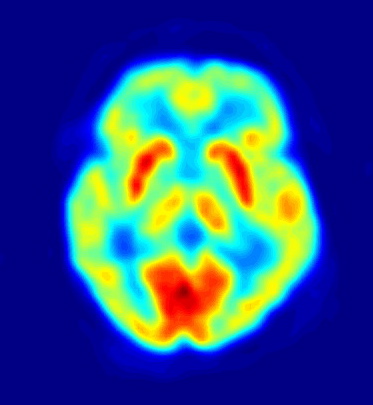Paying Attention
Interview with
Ben - Now, that's how the eye itself works even in some very unusual circumstances but an eye alone isn't much use without a brain to interpret what the pictures mean. It's not fully understood just yet how the brain interprets information from the eyes. There have been some very great advances recently. A Japanese team could predict what letter was being read just by looking at brain activity alone for example. But we do still have a long way to go. Now one problem is the issue of attention. How does the brain know what's important in any given view? Professor Alex Thiele is from Newcastle University where he's trying to work this out.
 Alex - I'm interested in how attention works and particularly in a mechanistic analysis of attention. So we kind of know what attention does to various aspects of our everyday perception but we don't really understand how it is implemented in the brain. So I'm looking at the brain chemicals that mediate various aspects of attention and I'm also looking at how neurons are affected by these brain chemicals and how neurons communicate and how neurons interact during attention. And one current view is that synchronous or oscillatory activity between groups of neurons is a very important aspect of attentional processing and I'm looking at those aspects, how different areas synchronize their activity and what these neuron modulators or neurotransmitters these brain chemicals, what role they play in this synchronicity.
Alex - I'm interested in how attention works and particularly in a mechanistic analysis of attention. So we kind of know what attention does to various aspects of our everyday perception but we don't really understand how it is implemented in the brain. So I'm looking at the brain chemicals that mediate various aspects of attention and I'm also looking at how neurons are affected by these brain chemicals and how neurons communicate and how neurons interact during attention. And one current view is that synchronous or oscillatory activity between groups of neurons is a very important aspect of attentional processing and I'm looking at those aspects, how different areas synchronize their activity and what these neuron modulators or neurotransmitters these brain chemicals, what role they play in this synchronicity.
Ben - Attention is a word that we use in common language a lot. We pay attention to a television program we're interested in or we pay attention to the weather broadcast for example to know what's coming up. Does it mean the same thing for you as it would do in common parlance?
Alex - In a way it does, and at the same time it doesn't. I think until a few years ago, attention was used in a fairly restrictive manner but most people now start to argue that attention really is just the process that allows us to use task relevant information appropriately. So if we are involved in a certain task, then we have to pay attention to the aspects that allow us to do the task. In tennis its one specific set of aspects looking at the ball making sure our movements are right. If we watch the weather forecast, it's a different task. So attention really allows task relevant information to be processed adequately, and non-task relevant information to be excluded from interference.
Ben - So, how do we know what's going on in the brain while we're diverting our attention to one particular thing?
 Alex - We know that neurons that process this particular aspect increase their activity so to speak, they shout louder. We also know that in, certainly in certain areas, neurons are synchronous and synchronous activity is kind of like clapping, a clapping audience that is synchronous where everyone claps at the same time makes the whole theater be much more noisy, much louder and that's what synchronicity in the brain also does in a way so we know the neuron shout louder. We know they act all together that then make sure that basically, they are above the noise and that aspects of the visual world reach consciousness.
Alex - We know that neurons that process this particular aspect increase their activity so to speak, they shout louder. We also know that in, certainly in certain areas, neurons are synchronous and synchronous activity is kind of like clapping, a clapping audience that is synchronous where everyone claps at the same time makes the whole theater be much more noisy, much louder and that's what synchronicity in the brain also does in a way so we know the neuron shout louder. We know they act all together that then make sure that basically, they are above the noise and that aspects of the visual world reach consciousness.
Ben - The brain is a phenomenally complicated and wonderful thing but it does have a tendency to go wrong. Are there processes where this attention can break down?
Alex - We are all distractible. There are diseases where attention doesn't work properly anymore. I mean Alzheimer's disease is one example, late stages of Parkinson's, certain stroke types show that attention doesn't work properly. In everyday life it would be more distractibility, that we can't focus properly, but how this actually happens in everyday life. I don't think people understand properly yet.
Ben - And one of the things you're looking at is brain chemistry. How do the different chemicals in the brain translate to paying attention?
Alex - Well we know very little about that. We know that certain chemicals which are called modulators like acetylcholine or dopamine or an adrenaline play some role in attention but exactly what role they play is still very little researched. I mean we recently were able to demonstrate for one particular part of the brain, the primary visual cortex, that acetylcholine mediates its effect through a specific receptor type but that is just in this one particular area. All the other areas are still, its unknown how acetylcholine works there. It is also at least to a large extent unknown how for example dopamine contributes to attention in a very detailed and mechanistic manner. And then there are the more traditional neurotransmitters like glutamate which acts through certain receptors again where specific receptor type may or may not contribute to attention. So we're just about to begin to understand how these different brain chemicals contribute to various aspects of attention and also to what aspects of attention because as I've said at the outset, attention is a complex phenomenon. It allows task relevant information to be processed and different neurotransmitters may allow different types of task relevant information to be processed accurately so it's, and well in a way fortunately, but at the same time unfortunately, a rather complicated interplay of all these brain chemicals.
Ben - So there's so much still to learn. This is really exciting stuff. He was a wonderful chap to talk to and really it is an interesting question of what does attention mean to me and what does it mean to him and what it means to other people. So there you go, that is Professor Alex Thiele from Newcastle University, explaining how the brain relies on coordinated nerve activity and a whole cocktail of chemicals in order to pay best attention to the world, depending on exactly what you're doing at the time.
- Previous Deep Sea Sight
- Next Learning from Bee Brains









Comments
Add a comment